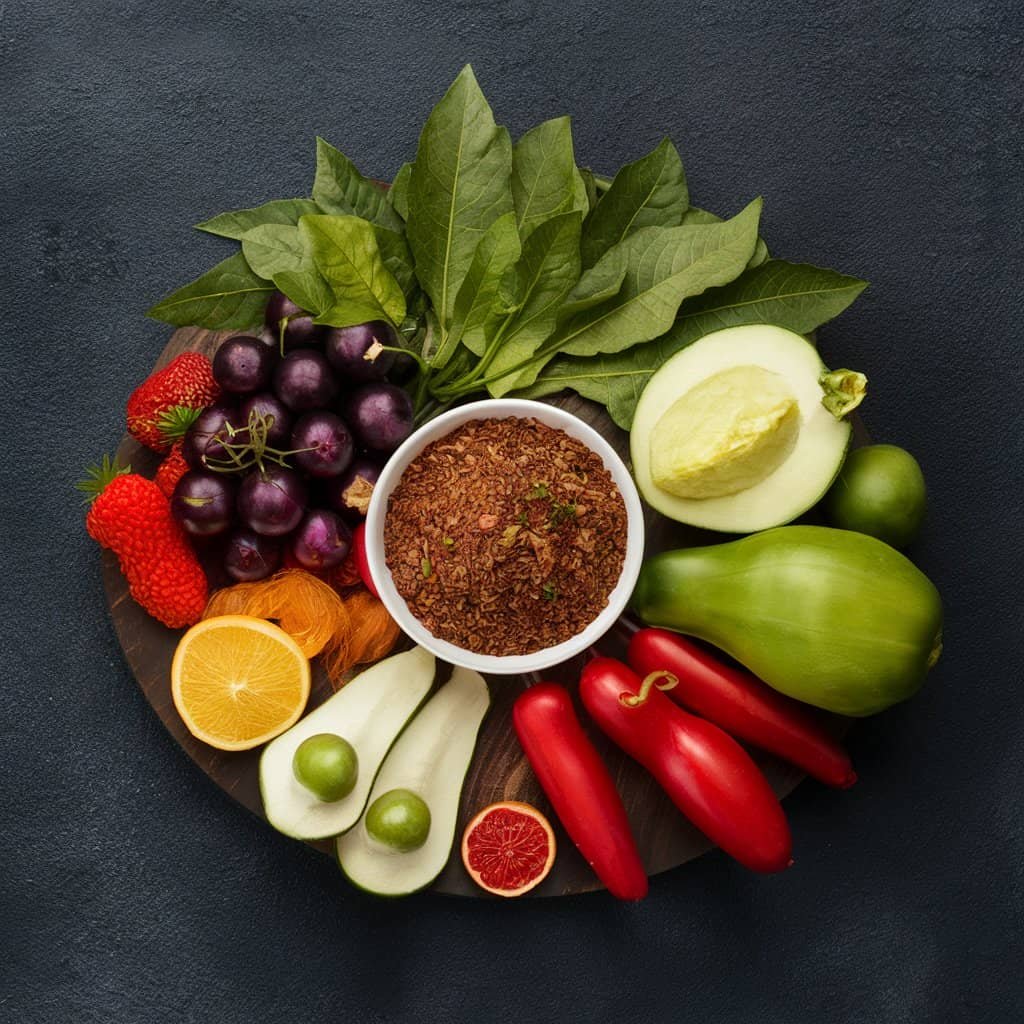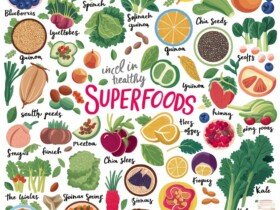Introduction at superfoods
Superfoods have garnered significant attention in recent years, but what exactly qualifies a food as a “superfood”? At its core, the term “superfood” refers to foods that are exceptionally rich in nutrients and beneficial compounds like vitamins, minerals, and antioxidants. These foods are often derived from natural sources and have been celebrated for their health-promoting properties for centuries. Commonly, superfoods are plant-based, though some fish and dairy are also included.
The origins of superfoods trace back to various ancient civilizations that utilized these nutrient-dense foods to enhance health and vitality. For example, quinoa, a staple in the diet of the ancient Incas, is now recognized for its high protein content and balanced amino acid profile. Similarly, berries such as acai and blueberries have been used in traditional medicine for their potent antioxidant properties.
Nutritional benefits are the cornerstone of what makes a superfood. These foods are typically packed with essential nutrients that play crucial roles in maintaining overall health. Vitamins like A, C, and E, minerals such as iron and magnesium, and a plethora of antioxidants are commonly found in superfoods. These nutrients not only support bodily functions but also help in preventing chronic diseases, boosting the immune system, and enhancing mental clarity.
Incorporating superfoods into one’s diet can be an effective strategy for achieving optimal health. Foods like leafy greens, nuts, seeds, and certain fruits and vegetables are not only nutrient-dense but also versatile in their culinary applications. Their high nutrient content, combined with their natural origin, makes them an essential component of a balanced and healthy diet. Understanding the common characteristics of superfoods—such as their high levels of vitamins, minerals, and antioxidants—can help individuals make informed dietary choices that promote well-being.
1. Blueberries
Blueberries are often hailed as a powerhouse of nutrients, earning their place among the top superfoods. These small, vibrant berries are high in antioxidants, particularly anthocyanins, which give them their distinctive color. Antioxidants play a crucial role in neutralizing free radicals, thereby reducing oxidative stress and lowering the risk of chronic diseases.
One of the key health benefits of blueberries is their positive impact on brain function. Studies have shown that regular consumption of blueberries can improve memory and cognitive function. The high levels of antioxidants in blueberries are believed to enhance brain health by combating oxidative stress and inflammation, which are factors that contribute to neurodegenerative diseases.
Blueberries are also beneficial for heart health. They help maintain healthy blood pressure levels and improve arterial function. The fiber, vitamins, and minerals in blueberries support the cardiovascular system, making them an excellent addition to a heart-healthy diet.

Incorporating blueberries into your diet is simple and versatile. You can add them to smoothies for a delicious and nutritious boost. They also make a great topping for salads, providing a sweet contrast to savory ingredients. Additionally, blueberries are a convenient and healthy snack on their own, perfect for satisfying sweet cravings without added sugars.
Incorporating blueberries into your daily routine can yield significant health benefits. Whether consumed fresh, frozen, or dried, these nutrient-dense berries can be easily integrated into various meals and snacks, making it simple to enjoy their health-boosting properties.
2. Kale
Kale is often hailed as a nutritional powerhouse, earning a well-deserved spot in the list of top superfoods. A member of the cruciferous vegetable family, kale is particularly noted for its impressive vitamin content. It is a rich source of vitamins K, A, and C. Vitamin K is essential for bone health, aiding in the regulation of calcium within the bones and bloodstream. Vitamin A supports vision, immune function, and reproduction, while vitamin C is crucial for the repair of tissues and the enzymatic production of certain neurotransmitters.
Beyond vitamins, kale also provides a substantial amount of dietary fiber, which is beneficial for digestive health. Fiber helps maintain bowel regularity and can aid in weight management by promoting a feeling of fullness. Additionally, kale is an excellent source of iron, a mineral vital for the production of hemoglobin and myoglobin, proteins that carry oxygen in the blood and muscles, respectively.
The health benefits of kale extend to supporting the immune system and reducing inflammation, thanks to its high levels of antioxidants such as quercetin and kaempferol. These compounds help combat oxidative stress, which can damage cells and contribute to chronic diseases.
Incorporating kale into your diet can be both simple and versatile. For a fresh and crisp option, kale can be used as the base of a salad, paired with other vegetables, fruits, nuts, and a light vinaigrette. It can also be added to soups, where its sturdy leaves hold up well to cooking, providing texture and nutrients. For a healthy snack alternative, consider baking kale chips. Simply toss the leaves with a small amount of olive oil and sea salt, then bake until crisp. These chips offer a satisfying crunch without the extra calories and unhealthy fats found in traditional snack foods.
By including kale in your regular diet, you can enjoy not only its unique, slightly bitter taste but also its myriad health benefits.
3. Salmon
Salmon stands out as a nutritional powerhouse among superfoods, largely due to its high content of omega-3 fatty acids. These essential fats are vital for maintaining heart health by reducing inflammation, lowering triglycerides, and decreasing the risk of heart disease. Additionally, omega-3s play a crucial role in supporting brain function, enhancing cognitive abilities, and potentially reducing the risk of neurodegenerative diseases.
Moreover, salmon is an excellent source of high-quality protein, vitamins D and B12, and selenium, all of which contribute to various aspects of health. Vitamin D is essential for bone health and immune function, while vitamin B12 supports nerve function and the production of red blood cells. Selenium acts as an antioxidant, protecting cells from damage and supporting thyroid health.
When choosing salmon, it is advisable to opt for wild-caught varieties over farmed ones. Wild-caught salmon generally contains higher levels of nutrients, including omega-3 fatty acids, and fewer contaminants such as pesticides and antibiotics that are commonly found in farmed fish. The nutrient profile of wild-caught salmon is superior, making it a healthier choice for regular consumption.
Salmon is also incredibly versatile in the kitchen, offering numerous ways to incorporate it into your diet. Grilling salmon steaks or fillets brings out a smoky flavor and a delightful texture. Baking salmon with a squeeze of lemon and a sprinkle of fresh herbs makes for a simple yet delicious meal. For a lighter option, consider adding flaked salmon to salads or using it as a topping for whole-grain toast. No matter how you prepare it, salmon can be a delightful and nutritious addition to your diet.
4. Quinoa
Quinoa has gained widespread recognition as a superfood, primarily due to its exceptional nutritional profile. One of the most remarkable aspects of quinoa is its status as a complete protein. Unlike most plant-based foods, quinoa contains all nine essential amino acids that the human body cannot produce on its own. This makes it an invaluable dietary component for vegetarians and vegans who might struggle to meet their protein needs through plant-based sources alone.
In addition to being a complete protein, quinoa is also rich in dietary fiber, which is crucial for maintaining digestive health. Its high fiber content aids in regulating blood sugar levels, lowering cholesterol, and promoting a feeling of fullness, which can be beneficial for weight management. Furthermore, quinoa is naturally gluten-free, making it an excellent choice for individuals with celiac disease or gluten intolerance.
Quinoa’s versatility in the kitchen is another reason for its popularity. It can be easily incorporated into a variety of meals, making it a staple in many health-conscious diets. For breakfast, quinoa can be used to create a nutritious porridge by cooking it with almond milk and topping it with fruits, nuts, and a drizzle of honey. For lunch or dinner, quinoa serves as an excellent base for grain bowls and salads. Combining it with ingredients such as roasted vegetables, leafy greens, beans, and a light vinaigrette can result in a satisfying and nutrient-dense meal.

Preparation of quinoa is straightforward. Begin by rinsing the seeds under cold water to remove any saponins, which can impart a bitter taste. Then, cook the quinoa in a 2:1 water-to-quinoa ratio, bringing it to a boil before reducing the heat and simmering for about 15 minutes until the water is absorbed. Fluff with a fork, and it’s ready to be enjoyed in a variety of dishes. By integrating quinoa into your diet, you can take advantage of its numerous health benefits, making it a worthy addition to any meal plan.
5. Chia Seeds
Chia seeds have rapidly gained popularity as a superfood due to their impressive nutritional profile and versatile usage. These tiny seeds are packed with essential nutrients, including high levels of omega-3 fatty acids, fiber, and protein, making them a valuable addition to any healthy diet.
One of the standout benefits of chia seeds is their omega-3 fatty acid content. Omega-3s are essential fats that play a crucial role in maintaining heart health by reducing inflammation and lowering cholesterol levels. Incorporating chia seeds into your diet can help ensure you meet your daily omega-3 requirements, especially if you follow a plant-based diet.
Chia seeds are also an excellent source of dietary fiber. Just a small serving can provide a significant portion of your daily fiber needs, promoting digestive health by supporting regular bowel movements and preventing constipation. The high fiber content in chia seeds also contributes to a feeling of fullness, which can aid in weight management by reducing overall calorie intake.
In addition to omega-3 fatty acids and fiber, chia seeds are rich in protein, essential for muscle repair and growth. This makes them an ideal addition to the diet of individuals looking to boost their protein intake without the need for animal-based products.
There are numerous practical ways to incorporate chia seeds into your daily meals. One popular method is adding them to smoothies, where they can blend seamlessly without altering the flavor. You can also sprinkle chia seeds over yogurt or oatmeal for an added nutritional boost. Another delicious option is making chia pudding by soaking the seeds in milk or a dairy-free alternative overnight, then adding your favorite fruits or nuts for a wholesome breakfast or snack.

Overall, chia seeds are a versatile and nutrient-dense addition to any diet, offering numerous health benefits and easy integration into various meals. By including chia seeds in your daily regimen, you can support your digestive health, manage weight, and maintain consistent energy levels throughout the day.
6. Avocado
Avocados are a powerhouse of nutrition, packed with numerous health benefits that make them a staple in a balanced diet. One of the primary reasons avocados are praised is their high content of healthy monounsaturated fats. These fats are essential for maintaining heart health by lowering bad cholesterol levels (LDL) and increasing good cholesterol (HDL). This contributes to a reduced risk of heart disease, which is a leading cause of mortality worldwide.
In addition to their beneficial fats, avocados are rich in dietary fiber, which is crucial for digestive health. Fiber aids in maintaining regular bowel movements, preventing constipation, and promoting a healthy gut microbiome. Furthermore, the fiber in avocados can help control blood sugar levels, making them an excellent choice for individuals managing diabetes.
Potassium is another significant nutrient found in avocados. This vital mineral plays a key role in maintaining electrolyte balance, which is essential for proper muscle function and nerve transmission. Potassium also helps regulate blood pressure, counteracting the effects of sodium and reducing the risk of hypertension.
Beyond these core benefits, avocados are known for enhancing skin health. Their high vitamin E content acts as an antioxidant, protecting skin cells from damage caused by free radicals. Additionally, the healthy fats in avocados keep the skin moisturized and supple, contributing to a youthful appearance.
Moreover, avocados support nutrient absorption. The fats in avocados increase the bioavailability of fat-soluble vitamins such as A, D, E, and K when consumed with other foods. This means that adding avocados to your meals can enhance the overall nutrient intake from your diet.
Incorporating avocados into your meals is simple and versatile. They can be added to salads, providing a creamy texture and rich flavor. Avocados also make a nutritious addition to sandwiches, offering a healthier alternative to traditional spreads like mayonnaise. For a quick snack, consider mashing avocados to create a delicious spread for toast. With their myriad benefits and culinary flexibility, avocados are indeed a superfood worth including in your diet.
7. Almonds
Almonds are a powerhouse of nutrients and an excellent addition to a healthy diet. Rich in healthy fats, particularly monounsaturated fats, they contribute significantly to cardiovascular health. These beneficial fats help in lowering bad cholesterol levels, thus reducing the risk of heart disease.
Furthermore, almonds are a great source of protein, making them an ideal choice for vegetarians and those looking to add more plant-based proteins to their diet. They are also loaded with vitamin E, a potent antioxidant that protects the body’s cells from oxidative damage. Consuming adequate vitamin E is crucial for skin health and immune function.
Magnesium is another vital nutrient found abundantly in almonds. This mineral plays a critical role in numerous bodily functions, including regulating blood sugar levels, supporting bone health, and maintaining proper muscle and nerve function. For individuals managing diabetes, incorporating almonds can help in controlling blood glucose levels due to their low glycemic index and high fiber content.
Almonds also contribute to weight management. Despite being calorie-dense, their high protein and fiber content promote feelings of fullness, which can help reduce overall calorie intake. Studies have shown that regular consumption of almonds is linked to lower body weight and reduced waist circumference.
There are numerous ways to incorporate almonds into your diet. Enjoy a handful of raw almonds as a convenient and nutritious snack. You can also add them to your smoothies for an extra protein and nutrient boost. For those who love baking, almond flour is a fantastic alternative to traditional wheat flour, offering a gluten-free option that enhances the nutritional profile of baked goods.
Incorporating almonds into your daily routine can significantly contribute to a balanced and healthy diet, providing numerous benefits for overall well-being.
8. Sweet Potatoes
Sweet potatoes are a nutritional powerhouse, offering a multitude of health benefits that make them a staple in a healthy diet. One of their most notable attributes is their high vitamin A content. A single serving of sweet potatoes can provide more than 400% of the daily recommended intake of vitamin A, primarily in the form of beta-carotene. This essential nutrient is crucial for maintaining good vision health, supporting the immune system, and promoting skin health.
In addition to vitamin A, sweet potatoes are an excellent source of dietary fiber. Fiber is indispensable for digestive health as it aids in maintaining regular bowel movements and preventing constipation. The fiber content in sweet potatoes also helps to regulate blood sugar levels, making them a suitable option for individuals with diabetes. Moreover, fiber contributes to a feeling of fullness, which can assist in weight management by curbing overeating.
Sweet potatoes are rich in antioxidants, compounds that help neutralize harmful free radicals in the body. Antioxidants play a significant role in reducing inflammation and lowering the risk of chronic diseases such as heart disease and cancer. The presence of vitamins C and E in sweet potatoes further enhances their antioxidant properties, offering additional protection against cellular damage.
When it comes to incorporating sweet potatoes into your diet, the possibilities are almost endless. They can be baked, roasted, mashed, or even added to soups and stews. For a simple yet delicious dish, try baking sweet potatoes in the oven, then topping them with a sprinkle of cinnamon and a drizzle of honey. Alternatively, you can roast them with olive oil, rosemary, and a pinch of sea salt for a savory side dish. Mashed sweet potatoes, seasoned with nutmeg and a touch of butter, make for a comforting and nutritious addition to any meal.
By including sweet potatoes in your diet, you not only enjoy their delightful taste but also reap the numerous health benefits they offer. Whether you’re looking to boost your vision health, support your immune function, or improve your digestive health, sweet potatoes are an excellent choice for a nutrient-dense addition to your meals.
























